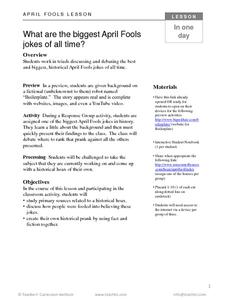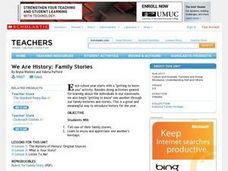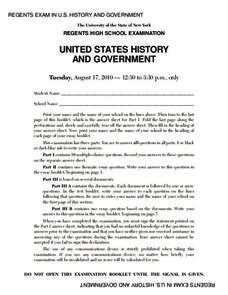TCI
What Are the Biggest April Fools Jokes of All Time?
After working in groups to analyze primary sources related to a historical hoax, learners will discuss how people managed to be fooled and work to identify one of the biggest April Fools jokes in history.
Center for History and New Media
Founding of the Laurel Grove School and Other "Colored" Schools in Fairfax County, 1860–1890
The right to public education was not always so clear in American history. Readers study several primary and secondary source documents, including property deeds, maps, and photographs, about the founding of local schools during the...
National Endowment for the Humanities
Revolution '67, Lesson 2: What Happened in July 1967? How Do We Know?
Even in a world in which dozens of participants and curious onlookers record every controversial event, the basic facts of what happened are often in dispute. Revolution '67, Lesson 2 explores 1967 Newark, New Jersey using an examination...
Curated OER
We Are History: Family Stories
Young scholars examine their own family heritage and share family stories with the class. They differentiate between primary and secondary sources, and bring in and write about three artifacts from their family. They conduct an...
Curated OER
Education, Design & Empowerment: Part One
Learners consider the connection between poverty and education. In this language arts and social studies lesson plan, students research primary and secondary sources in order to explore the relationship between education and poverty.
Curated OER
Anti-Slavery and Reform-Related Sources
Fifth graders use primary sources to explore events witnessed by ordinary people. In this primary documents lesson, 5th graders answer critical thinking questions based on their documents. Students recognize the difference between...
Curated OER
Past Imperfect: Examining Secondary Sources of the American Revolution
Ninth graders respond in essay form to the following writing prompt. Mel Gibson, star of The Patriot, is quoted as stating, "If one were to adhere to historical accuracy all the way, you'd probably have the most boring two hours on...
National Woman's History Museum
Unsung Voices: Black Women and Their Role in Women's Suffrage
Reclaim perspectives often left out of the narrative about the suffrage movement with an activity that lifts up the voices of African American women. Using primary sources and biographical details of Fannie Barrier Williams' life, young...
PBS
1000 Words
A picture really can speak a thousand words—no matter how old! Scholars become history detectives as they learn how to analyze historical photos and evidence to uncover the past. The fun hands-on activity makes history come alive through...
Curated OER
Revolt
Knowing what questions to ask and knowing how to organize information found is often difficult for young researchers. Consider using this activity to help guide a revolutions research project. Researchers are first directed to examine...
Curated OER
Document Analysis Sheet
Sometimes all kids need is a little guided practice and then they can be on their way. They can use an analysis worksheet to help them analyze a primary or secondary source document. They answer several questions describing the type of...
Curated OER
Activity 10: Primary and Secondary Sources
Students sort documents into primary and secondary sources and analyze their reliability. In this history research lesson plan, the teacher gathers a selection of document images, then discusses primary and secondary sources and their...
Curated OER
Real-Life History: Looking at Our Community
Spend several days with your class exploring local history. Learners brainstorm and categorize sources of historical information as primary or secondary; collect and present artifacts from family/community; construct a definition of...
Curated OER
Can you Prove it?
Tenth graders examine how primary source documents help authors and museum curators interpret historic events. In this social studies lesson plan, 10th graders research primary source documents. Students create a powerpoint to present...
New York State Education Department
Global History and Geography Examination: January 2011
Using primary and secondary sources—including classics such as the Communist Manifesto—class members consider the effects of these ideas on the course of history. Another essay prompt explores geography and history, while multiple-choice...
New York State Education Department
US History and Government Examination: August 2010
Geography has played a complex role in America history. The Atlantic Ocean has served as a buffer to protect the United States from European Wars, but its proximity to Cuba, however, left it vulnerable to nuclear war during the Cuban...
National Woman's History Museum
Defying British Rule: Women's Contributions to The American Revolution
Primary and secondary sources are the focus of a lesson that showcases the important role women played during the American Revolution. Pairs review sources and discuss their findings. A close-reading of an informational text leads the...
Curated OER
Introduction to Primary and Secondary Sources
Fourth graders are introduced to primary and secondary sources. Using examples of each type of source, they work together to identify which are primary and which are secondary sources. They end the lesson by reviewing the...
Curated OER
Abigail’s War: The American Revolution through the Eyes of Abigail Adams
Four lessons, performed over four weeks, pay special attention to Abigail Adams. Fifth graders analyze primary and secondary sources, read texts, discuss and write about Adams' experience during the Revolutionary War—the Battle of Bunker...
Curated OER
George Winter
Who is George Winter? Learners review knowledge of George Winter, an artist who captured images of the Trail of Tears. They distinguish the difference between primary and secondary sources and determine the reliability of a document....
Curated OER
Primary or Secondary Source?
In this primary and secondary sources worksheet, students look at a picture of colonial trapper, then answer 6 questions about source and specifics of the picture.
Curated OER
Primary Sources and Protagonists: A Native American Literature Unit
Introduce your middle schoolers to the lives of past Native Americans. First, learners work together to put photographs in a sequence. Then, using their sequence, they create stories to share with the whole class. No matter how old your...
Echoes & Reflections
Perpetrators, Collaborators, and Bystanders
After the Holocaust, the world grappled with how to bring justice to the Nazis. But what to do with the thousands—if not millions—who allowed it to happen? Young historians consider the issues of guilt, collaboration, and responsibility...
NPR
Chinese American Women Lesson Plan
The National Women's History Museum provides a plan designed to accompany their online CyberExhibit, Chinese American Women; a History of Resilience and Resistance. After examining a series of primary and secondary source documents,...

























